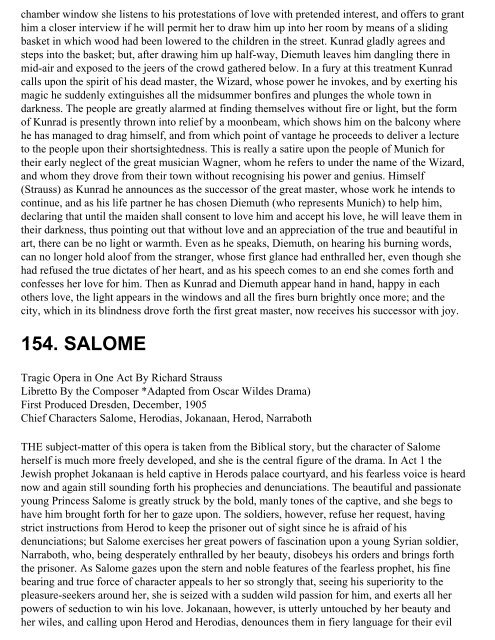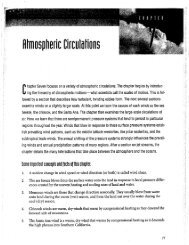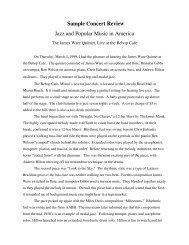Opera Plots I - MDC Faculty Home Pages
Opera Plots I - MDC Faculty Home Pages
Opera Plots I - MDC Faculty Home Pages
You also want an ePaper? Increase the reach of your titles
YUMPU automatically turns print PDFs into web optimized ePapers that Google loves.
chamber window she listens to his protestations of love with pretended interest, and offers to grant<br />
him a closer interview if he will permit her to draw him up into her room by means of a sliding<br />
basket in which wood had been lowered to the children in the street. Kunrad gladly agrees and<br />
steps into the basket; but, after drawing him up half-way, Diemuth leaves him dangling there in<br />
mid-air and exposed to the jeers of the crowd gathered below. In a fury at this treatment Kunrad<br />
calls upon the spirit of his dead master, the Wizard, whose power he invokes, and by exerting his<br />
magic he suddenly extinguishes all the midsummer bonfires and plunges the whole town in<br />
darkness. The people are greatly alarmed at finding themselves without fire or light, but the form<br />
of Kunrad is presently thrown into relief by a moonbeam, which shows him on the balcony where<br />
he has managed to drag himself, and from which point of vantage he proceeds to deliver a lecture<br />
to the people upon their shortsightedness. This is really a satire upon the people of Munich for<br />
their early neglect of the great musician Wagner, whom he refers to under the name of the Wizard,<br />
and whom they drove from their town without recognising his power and genius. Himself<br />
(Strauss) as Kunrad he announces as the successor of the great master, whose work he intends to<br />
continue, and as his life partner he has chosen Diemuth (who represents Munich) to help him,<br />
declaring that until the maiden shall consent to love him and accept his love, he will leave them in<br />
their darkness, thus pointing out that without love and an appreciation of the true and beautiful in<br />
art, there can be no light or warmth. Even as he speaks, Diemuth, on hearing his burning words,<br />
can no longer hold aloof from the stranger, whose first glance had enthralled her, even though she<br />
had refused the true dictates of her heart, and as his speech comes to an end she comes forth and<br />
confesses her love for him. Then as Kunrad and Diemuth appear hand in hand, happy in each<br />
others love, the light appears in the windows and all the fires burn brightly once more; and the<br />
city, which in its blindness drove forth the first great master, now receives his successor with joy.<br />
154. SALOME<br />
Tragic <strong>Opera</strong> in One Act By Richard Strauss<br />
Libretto By the Composer *Adapted from Oscar Wildes Drama)<br />
First Produced Dresden, December, 1905<br />
Chief Characters Salome, Herodias, Jokanaan, Herod, Narraboth<br />
THE subject-matter of this opera is taken from the Biblical story, but the character of Salome<br />
herself is much more freely developed, and she is the central figure of the drama. In Act 1 the<br />
Jewish prophet Jokanaan is held captive in Herods palace courtyard, and his fearless voice is heard<br />
now and again still sounding forth his prophecies and denunciations. The beautiful and passionate<br />
young Princess Salome is greatly struck by the bold, manly tones of the captive, and she begs to<br />
have him brought forth for her to gaze upon. The soldiers, however, refuse her request, having<br />
strict instructions from Herod to keep the prisoner out of sight since he is afraid of his<br />
denunciations; but Salome exercises her great powers of fascination upon a young Syrian soldier,<br />
Narraboth, who, being desperately enthralled by her beauty, disobeys his orders and brings forth<br />
the prisoner. As Salome gazes upon the stern and noble features of the fearless prophet, his fine<br />
bearing and true force of character appeals to her so strongly that, seeing his superiority to the<br />
pleasure-seekers around her, she is seized with a sudden wild passion for him, and exerts all her<br />
powers of seduction to win his love. Jokanaan, however, is utterly untouched by her beauty and<br />
her wiles, and calling upon Herod and Herodias, denounces them in fiery language for their evil













